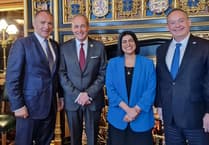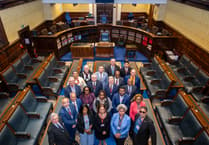A recent news item has brought back memories of one of the most lamentable episodes in the modern history of the Isle of Man.
It was a time when Manx politicians were queuing up to express their abhorrence of an innocent minority group.
The island’s reputation was damaged for decades as mainland media portrayed this place as a backwater of bigotry and intolerance.
And we came close to the constitutional calamity of having legislation imposed upon us by the United Kingdom.
As a young journalist I witnessed it all and there were moments when I was ashamed to be Manx.
I am referring, of course, to the great gay sex controversy of 30 years ago, when the House of Keys refused to modernise the island’s laws on homosexuality. Reform finally happened in 1992, after much wailing and gnashing of teeth.
Today the Home Affairs Department is proposing that a pardon be offered to anyone convicted under gay sex laws now repealed. The provision is included in a draft sexual offences bill that has just been out to public consultation.
The gesture shows how much the social and political character of a community can be transformed between generations.
The island was a different place back in the 1980s, when the European Court of Human Rights (ECHR) ruled that laws criminalising gay sex in private were a breach of the right to privacy.
The ruling was made in relation to Northern Ireland, where Dr Ian Paisley had been running a typically understated campaign of resistance to liberalisation, under the banner ’Save Ulster From Sodomy’.
In due course the UK Government, which has parental responsibility for the island’s compliance with international law, helpfully pointed out that the ECHR judgement also applied to the Isle of Man.
We would have to remove the offending legislation or in the last resort have it abolished by Westminster. Such an intervention would puncture the island’s status as a self-governing jurisdiction, which was and is so important economically, and create a dangerous precedent for future relations with the UK.
But this grave threat was a secondary matter for a significant number of MHKs and their constituents. What concerned them most was the prospect of unnatural practices being condoned and allowed to spread like a contagion amongst decent folk.
The reaction was so fearful it was as if gay sex would be compulsory rather than merely permissible.
The then Chief Minister Miles Walker (now Sir Miles) insisted change was necessary to protect the constitutional integrity of the Isle of Man. For this courageous and responsible stance he endured personal abuse.
When reforming legislation was brought forward it was blocked, by a narrow margin, in the House of Keys in May 1987.
The language from a couple of members during that debate made me realise the parliament of our nation could contain the worst sort of parochial ignoramus. If these were the people’s representatives, what did that say about the people? My patriotic pride was suspended for the duration of the controversy.
The following year a Keys committee concluded that changing the law ’would not be acceptable to the vast majority of the people of the Isle of Man’.’
But there had been no polling of public opinion, so how could they tell?
All went quiet for a while until the proposed reform resurfaced in 1990. The matter was referred to another committee of MHKs, which contended the status quo could be defended on health grounds, as a protection against the spread of AIDS. It was a desperate argument, but the gay plague was often cited amid the homophobic hysteria of the period.
With a general election just a few months away, in May 1991 the House voted 13-8 against change.
In July that year militant gay rights activists from the UK demonstrated on Tynwald Day at St John’s, behaving outrageously amongst the bonnag stalls and W.I. tents.
The British media had a field day, and the strange Bible-clutching types they interviewed were taken as representative of life in the Isle of Man.
Many residents, politicians and church-goers were more rational, but extreme examples make better stories for journalists.
It was all rather bizarre, but there was tragedy too. In an oppressive atmosphere made far worse by some over-zealous policing, we heard of men taking their own lives. That it had come to this was a national disgrace.
The whole sorry affair fizzled out following the inscrutable outcome of the November 1991 general election, in which both proponents and opponents of change retained their seats and popularity. Maybe the gay sex thing was no big deal after all.
The new House of Keys voted 13-11 in favour of reform and soon people were wondering what all the fuss was about. The island never was invaded by hordes of homosexual holidaymakers, despite dire warnings.
Could such a horrible hoo-ha happen today? Certainly not in relation to equality issues, because the current generation of voters and politicians is much more enlightened.
But the rumpus also reflected a democratic culture in which MHKs could be driven by a vociferous local reaction that did not necessarily represent wider public opinion or the best interests of the island.
Has that changed too?




